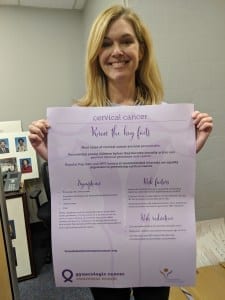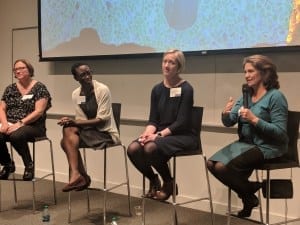
SGO highlights importance of advanced communication
UW Medicine offers blueprint of GCAM resources distribution
Submissions needed for December Wellness blog
National Race to End Women’s Cancer two weeks away
November 25 deadline for FWC grants and prizes
Volunteers sought for SGO 2021 Annual Meeting Program Committee
Upcoming programs on ‘What Black Women Need to Know about Endometrial Cancer’
SGO highlights importance of advanced communication
Effective communication between gynecologic oncology providers and patients is vital to patient-centered care. Skilled communication improves a patient’s knowledge retention and alleviates the anxiety of patients and caregivers, and it is also associated with reduced provider burnout. The SGO Palliative Care Task Force addresses this issue in their article: “Advanced communication: A critical component of high quality gynecologic cancer care: A Society of Gynecologic Oncology evidence based review and guide” in the October 2019 edition of Gynecologic Oncology.
“Of all the things we do [as gynecologic oncologists], communicating with our patients and their families is such an important part of what we do,” said co-author Amanika Kumar, MD. “The feeling was either you are good at this or you are not, but the literature shows that you can become a good communicator.”
“There is nothing more integral to effective gyn oncology care than the ability to successfully communicate difficult news to a patient and to elicit a patient’s goals and values so that the treatment plan reflects those goals,” said co-author Kerri Bevis, MD. “The fact that there is evidence-based methodology for teaching clinicians to navigate those conversations including both skills and overall strategies that can be taught and practiced is practice changing for the majority of people who have the opportunity to participate. Our goal was to bring awareness to the SGO membership so that more people can have access to these opportunities.”
A number of communication skills training (CST) programs have been developed to address the challenge of serious conversations in clinical practice. Most evidence-based communication strategies generally share these basic four components:
- Prepare and gather information, assess patient knowledge/understanding
- Inform patient in accordance with her communication preferences
- Expect emotion and address with empathic statements
- Elicit patient values and create a plan based on those values.
“In medical school, being a good communicator especially in difficult situations was rarely brought up, but now I’m seeing it more commonly brought up in medical school, residency and fellowship,” explained Dr. Kumar. “Until you start practicing and you are the one in charge of talking to the patients, you don’t know how important this will be.”
Co-author Ramey Littell, MD, noted that more experienced practitioners can also benefit from CST. “Even the most advanced professional athletes and musicians seek to improve their skills through expert coaching,” he said. “Most of us learned communication by trial and error through watching our mentors, before there was much research into what really works. Using an evidence-based roadmap makes communication more clear, direct and efficient, as well as more compassionate and satisfying for physicians at every level of their career.”
The article points to resources for in-person training courses, including the online training modules through VitalTalk and the CAPC (Center to Advance Palliative Care). “Some institutions have developed their own communication training programs, though not all use evidence-based methods we describe,” said Dr. Littell. “The best way to gain expertise in a skill is to practice and get expert coaching, and serious illness communication is no exception.”
Dr. Bevis cited an article in the November 2019 edition of Gynecologic Oncology Reports, “Pilot study of a condensed communication skills workshop for gynecologic oncology fellows,” which describes the implementation of a CST program at an institutional level.
“We feel that if members of SGO are offered the opportunity to participate in communication skills training and see firsthand how beneficial it is to their practice, then the number of individual champions will increase as will the opportunities for other SGO members to have access to this practice improving training,” said Dr. Bevis.
Efforts to adapt CST to gynecologic oncology fellowship training and provide these training opportunities in conjunction with regional and national meetings are ongoing.
“It is now recognized that how we communicate with patients is more than a nice touch, but it is central to the quality of care they receive,” said Dr. Littell. “Patient outcomes are improved, including increased trust, decreased anxiety, and care that matches their goals and values. It also decreases physician burnout: when tough conversations become less difficult, then our days go better and we are less stressed.”
UW Medicine offers blueprint of GCAM resources distribution

Heidi Gray, MD, holds up a poster that is available for download on the GCAM Toolkit.
During September’s Gynecologic Cancer Awareness Month (GCAM) nearly 250,000 people were reached via social media by the Foundation for Women’s Cancer (FWC) GCAM campaign, and the GCAM Toolkit was viewed almost 3,500 times. This toolkit includes social media downloads and PDF poster files, a gynecologic cancer wellness and preventive health plan, and a survivorship calendar. At the University of Washington School of Medicine in Seattle, the Department of Obstetrics and Gynecology made a concerted effort to spread information about GCAM with poster displays, social media posts, and a faculty panel discussion for their community of grateful patients, current patients, and their loved ones.
According to Annie Kuo, the department’s Director of Marketing Communications, UW Medicine printed a total of 200 large posters (50 each of the different women’s cancer posters). UW received permission from FWC to co-brand the poster and add the UW Medicine logo and URL to the posters. Kuo suggests printing them, with permission, directly on the source file or by affixing clear stickers on the posters. The department’s distribution plan included UW Medicine’s general OB/GYN clinics at hospital sites and neighborhood clinics.
“On our social media account @uwashobgyn, we posted photos of staff and faculty holding up each GCAM poster that we had printed (including Heidi Gray, MD, pictured at right) using the #GCAM hashtag,” Kuo explained. “We invited staff to dress in purple, the color of GCAM, for a group photo to post on our website and social media. We also retweeted posts from our Gynecologic Oncology faculty about different kinds of women’s cancers, legislative advocacy, and affiliations they participate in to support patient care and survivorship.”

(L-R) Kathryn Pennington, MD; Kemi Doll, MD, MCSR; Barbara Norquist, MD and Elizabeth Swisher, MD, participate in a faculty panel discussion on “Women’s Cancers: Fear or Hope?” during Gynecologic Cancer Awareness Month.
At the end of September, UW Medicine hosted a faculty panel discussion, “Women’s Cancers: Fear or Hope?” for a community of grateful patients, current patients, and loved ones to learn about UW Medicine’s work on the front lines of treatment, discovery and education. Panelists from the Division of Gynecologic Oncology included Kathryn Pennington, MD; Kemi Doll, MD, MCSR; Barbara Norquist, MD; and Elizabeth Swisher, MD.
Plans are already in the works for even greater distribution of materials for GCAM 2020. “We recommend outreach to any healthcare provider’s office that treats women and children: OB/GYNs, primary care physicians, and pediatricians,” said Kuo.
Submissions needed for December Wellness blog
This December, the SGO Wellness Taskforce would like to spread some holiday cheer with video wellness messages, and they need your help! SGO members are invited to record and submit a 30-second holiday video message while you and your team participate in a wellness activity—such as yoga exercises, a coffee break, didactics, grand rounds, etc. Interested members please contact Traci Schwendner for more information. The deadline to submit your video entries is Nov. 27, 2019.
National Race to End Women’s Cancer two weeks away
The Foundation for Women’s Cancer is looking forward to seeing everyone at the National Race to End Women’s Cancer on Freedom Plaza in Washington, DC, on Sunday, Nov. 3. This is the 10th National Race to End Women’s Cancer, and SGO members are encouraged to join the SGO & Friends Team. If you can’t make it to DC for the race, you can still join the SGO & Friends Team and support their efforts virtually.
November 25 deadline for FWC grants and prizes
The Foundation for Women’s Cancer (FWC) is still accepting applications for two Fellow-in-Training grants plus three research prizes, all of which have an entry deadline of Monday, Nov. 25 at 11:59 p.m. CT. More information about the prizes themselves can be found on the FWC research portal, and the key details are as follows:
FWC Grants
Two (2) Fellow-in-Training Grants (one-year, $10,000 each)
- These grants are only available to those individuals who are fellows as well as SGO members.
- Applicants are encouraged to develop research proposals related to ovarian cancer that incorporate cooperation with colleagues from other institutions. Submissions addressing rare diseases, therapeutics, quality of life, patient-reported outcomes, education or palliative care are also encouraged.
FWC Research Prizes
The Foundation for Women’s Cancer/Norma Livingston Ovarian Cancer Foundation Excellence in Ovarian Cancer Research Prize ($5,000)
- Applicants must be a past Research Grant Recipient of the Foundation to apply for this.
- The award is made payable directly to the individual and not their institution.
- The Prize will be given to an individual who can best demonstrate that he or she has been able to use their Foundation award to improve women’s health care by obtaining independent extramural funding, making important contributions to the literature, and/or developing programs that improved women’s health care, including early detection.
The Perlman Family CCARE Lynch Syndrome Research Prize ($2,500)
- This is intended for a trainee to support a summer or short-term research project that advances knowledge about Lynch syndrome and its role in gynecologic cancers.
- Applicants must submit a short summary of the project’s goals and expected outcomes co-signed by the applicant’s mentor and supervisor.
The Nina Donnelley and The Dickens Fund of the Donnelley Foundation Young Investigator Award in Honor of Laurel W. Rice, MD ($1,000)
- This Prize is meant for a fellow or resident who has promise to contribute to the field of gynecologic oncology in the future.
Volunteers sought for SGO 2021 Annual Meeting Program Committee
Be an essential part of planning for the SGO 2021 Annual Meeting on Women’s Cancer, March 20-23, 2021, in Seattle, WA–volunteer for the Program Committee. The application period is Oct. 10 – Nov. 14, 2019. Direct any questions to SGO’s Education Department at education@sgo.org.
Upcoming programs on ‘What Black Women Need to Know about Endometrial Cancer’
Chicago and Los Angeles area SGO members: Black Health Matters and the Endometrial Cancer Action Network for African Americans (ECANA) are hosting two informational programs on “What Black Women Need to Know about Endometrial Cancer.” Research suggests that African American women may present with endometrial cancer at later stages after having waited longer to seek care due to a lack of awareness about the symptoms of the disease. When Black women do report symptoms, they are less likely to have appropriate diagnostic procedures. Please let your patients know about these upcoming events:
Oct. 19, 2019: Malcom X College, 1900 W Jackson Blvd, Chicago, IL 60612 from 10 to 11:30 a.m. CT. A flyer is available for download with additional details. The presenter will be Sarah Temkin, MD, from the Anne Arundel Medical Center in Annapolis, MD.
Nov. 1, 2019: First African Methodist Episcopal Church of Los Angeles, 2270 S. Harvard Blvd., Los Angeles, CA, from 6 to 8 p.m. PT. A flyer is available for download with additional details. This event will be presented by Kemi Doll, MD, MCSR, from the University of Washington in Seattle. Dr. Doll is the co-founder and project lead for ECANA.
A light meal and refreshments will be served at both events. This educational initiative is sponsored by Eisai.
